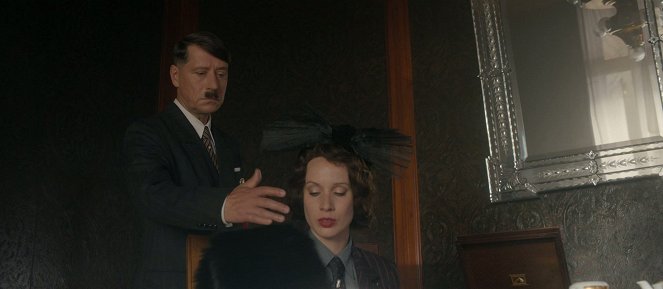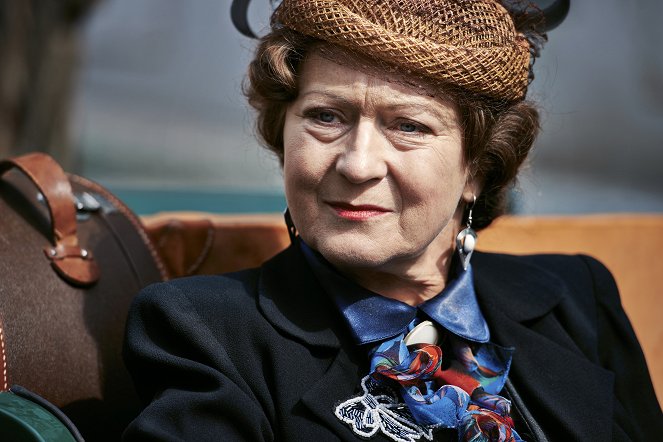Directed by:
Filip RenčScreenplay:
Ivan HubačCinematography:
Petr HojdaComposer:
Ondřej SoukupCast:
Táňa Pauhofová, Karl Markovics, Gedeon Burkhard, Zdenka Procházková, Simona Stašová, Martin Huba, Anna Fialová, Jiří Mádl, Lenka Vlasáková, Pavel Kříž (more)Plots(1)
One of the greatest untold love stories of the 20th century, this is the story of Lída Baarová, a beautiful Czech actress, who conquered Germany's silver screen as well as the heart of one of the Third Reich's most powerful men: the Minister of Propaganda, Joseph Goebbels. How could Hitler's chief ideologist fall in love with a non-Aryan Slavonic beauty whose race had been designated as inferior by the Führer in "Mein Kampf" and whose country was soon to be occupied by the Nazis? How could one of Europe's most glamorous actresses reject offers of stardom from Hollywood in preference to a dangerous romance with the Nazi monster with a deformed leg? The movie will shatter taboos and probe the thin red line between demonic ideology and passions of the heart. (official distributor synopsis)
(more)Videos (2)
Reviews (9)
The story of Lída Baarová holds the potential for a great historical film, as well as for reflection on the essentially Czech and still unaddressed issue of the moral considerations of life under totalitarianism, or rather the national guilt of ethically ambivalent everyday existence under the past regimes. However, none of that comes across in this highly ridiculous yet soul-crushing mess. In the few scenes where the film touches on the life of Lída Baarová and her career in Nazi Germany, it offers up an insipid illustration in the best case, though it rather relies on superficial exploitation of the audience’s prejudices. The Nazi leaders, the Czech collaborators and finally the unhinged mother and the young journalist are probably intended to be great roles, but they never rise above the level of ridiculously stiff caricature. In addition to the passages with Goebbels, which go far beyond the boundaries of camp thanks to the overwrought acting, writing and directing, the film contains nonsensical sequences that take Baarová’s story into unexpected genre realms. Of these, the one that stands out the most is the etude that seems to have been cut out of a vulgar teen comedy, which is appropriately highlighted by the casting of Jiří Mádl. The narrative is another story. It takes a step toward the concept of an unreliable narrator, but due to its haphazardness, it ends up being a mere pile of nonsensical, impotently literal and boorishly phantasmagorical scenes that reek of paper, cocaine and stupidity. As a result, The Devil’s Mistress is neither a great biographical film nor powerful Nazisploitation, nor an ethical drama, nor just ordinary trash. Rather, it’s just a disarming fiasco whose main constants are poor judgment and incompetence. On the other hand, the project apparently had at least some ambition to show a controversial figure of 20th-century Czech history in a different light than as a demonised collaborator (though the image of a starlet blinded by love and her own fame is barely more flattering). Paradoxically, the film itself became a subject of controversy in modern Czech culture due to the involvement of neo-Nazis, the expenditure of enormous sums, which was definitely not apparent on the screen, and the strange sell-out in the form of a VIP-studded premiere, which in line with the phrase “life imitates art” mirrored the scene of a premiere with Goebbels in attendance. But perhaps in a few decades, the case of Renč, Hubač and Landa will serve as a preview for a similarly disorderly film that will show them as tragic greats blinded by their love for tyrants and themselves.
()
A film with ambitions and material for a European blockbuster, with a big budget (by Czech standards) and massive advertising campaign. But the result is disappointing - it’s been a long time since I saw such a disgustingly cheap piece of nonsense. Some characters are dubbed while others not, sometimes it’s exhaustingly lengthy, other times simplistic. Don't even get me started on the soundtrack. It is so inappropriate for the movie it almost made me cringe. If this is supposed to be Renč's masterpiece he had been waiting to make for years, I am afraid of what to expect from his next "regular" project.
()
An empty bubble, perfectly crafted tabloid PR and a desperate report on the state of domestic cinema all in one. I went into it with a preconceived notion, but I was still surprised at how terribly shallow it ended up being. There’s not even a hint of an attempt to get under the skin of any of the characters. Hubač and Renč ride a primitive wave that follows Goebbels' slimy stares and Lída's guileless naivety as a simpleton, with clouds of declamatory side characters around them that are completely useless for moving the plot along. Renč's incompetence as a director is fully manifested in all the meaninglessness as he masks all the primitiveness with camera kitsch, dubious editing, and a strange pleasure in exploitation, which allows relieved volleys of laughter to come out. Sometimes it amazes me how far creative ambitions actually go.
()
Lída? Misery. Filip Renč simply doesn't make films for me, although unfortunately every now and then he picks a subject that I would be interested in. His Lída Baarová is only unintentionally funny most of the time. The actors, though well chosen in type, give virtually no performances (perhaps most evident in Hitler's "Do you like Wagner?" Pavel Kříž, who is not funny until he speaks for the first time, and Karl Markovics, who pretends to be a Robert De Niro impersonator most of the time and the dubbing of Viktor Preiss does not go down well with him at all), the script is stupid, either unnecessarily semi-opinionated, or again abbreviated to the point of shame, the viewer has no chance to even understand the main heroine, let alone judge her together with the young student in the finale... And where did that mammoth budget go? I don't really know, because the opening scene looks badly televised, like something out of Cops and Robbers. And it's not the last. The overall miserable impression is only added to by the unusually bizarre scenes like the "love" moment and the faces in flames or the complete ending with the lamp going out - nobody could have taken this seriously! I am only comforted by the fact that I was far from the only one in the cinema who laughed so often.
()
When I went to the cinema to see the most anticipated Czech film of the year, I had both options in mind - that it would either be a hit or a dud, and Lída Baarová hovers precariously between both extremes. The life of one of the most beautiful Czech actresses of the 1930s offers some very dense material for a film, so there was, is and will be some potential here. I have to say that more could have been made of it, but I also have to admit that the film has some captivating and imaginative scenes. The desire for worldliness is often a stumbling block in Czech productions, even though success can be achieved in a nice Czech way, and that is why some sequences look too artificial and mechanical. A big plus for me was the intertwining of two timelines, which complemented each other well – I was also impressed by the voice-over of old Baarová, which was one of those moments when ripping off foreign films paid off. Personally, I was more taken with the second half, as the first, though nicely shot, was more protracted, while the second had more momentum and the tragic nature did its part as well. I won't comment on the use of German in the film, as it would be a long story, perhaps I can only add that in many American films foreigners mostly speak English, so why make such a big fuss over a Czech-speaking Hitler. Lída Baarová will probably not go down in the history of Czech cinema as a spectacular big film, but I don't want to unfairly cast aspersions, because there effort was there.
()



Ads